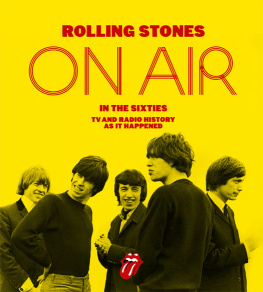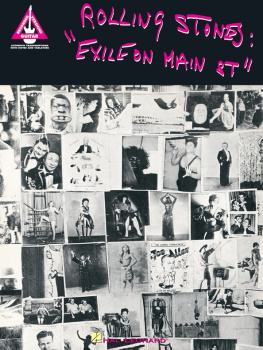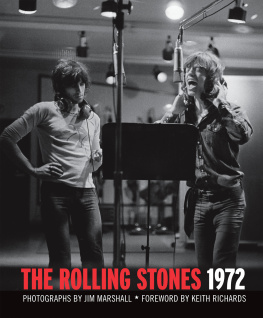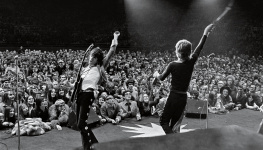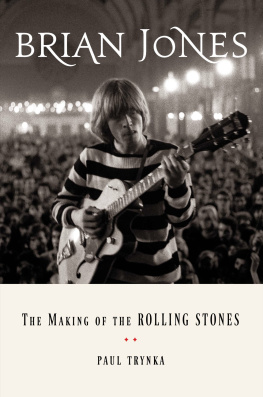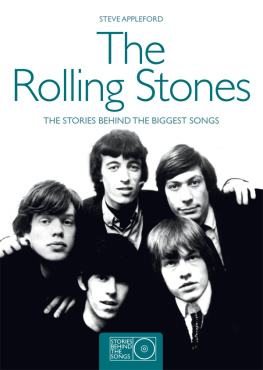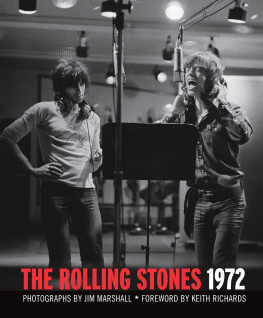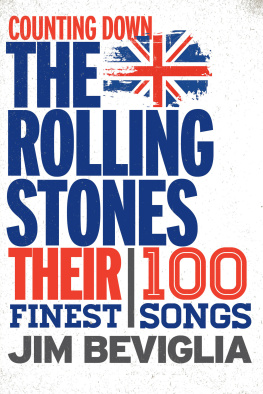
Photo: Philip Townsend

Photo: Philip Townsend


Photos: Michael Ochs Archives and Philip Townsend

The Stones on Edith Grove, 1963
Photo: Mark and Colleen Hayward/Redferns
The Rolling Stones were war babies. They were all born or grew up during the Second World War.
Keith Richards is the youngest of the original band members, born in December 1943, on the day that the Mills Brothers were at the top of the American charts; they were the first African-American artists to have the honour following the launch of the first official Billboard chart in January 1940. The UK would have to wait for almost thirteen years until the New Musical Express published the first singles chart.
Mick Jagger is five months older than Keith, having been born in July, on the day that the Allies captured Palermo in Sicily, the island from which the families of Frank Sinatra, Dean Martin and Frankie Laine originated.
Of the original members, Brian Jones was the middle ranking in terms of age, having been born in February 1942, a point in the war when things were going badly for the Allies in the Far East following the fall of Singapore to the Japanese. Charlie Watts was born in June 1941 at University College Hospital London, as the Luftwaffe Blitz on the UKs capital was coming to an end. Bill Wyman was born in October 1936 and he is the only one of the original band members who has significant recollections of the war.
The first television broadcasts in Britain began shortly before World War Two, but hardly anyone had a TV and they were stopped immediately war broke out in September 1939. Television went back on air in 1947, but even by 1951 there were only two transmitters (one in London, the other in Birmingham), which meant that fewer than 10 per cent of British homes had a TV set. In the BBC Year Book of 1946 the corporation had this to say about the future of television: As for programmes, there is no limit to what viewers can hope to see. Judging from previous experience, the most popular items will probably be television outside broadcasts of sporting events Cup Finals, the Derby, big boxing matches, tennis, cricket, seen whilst they are actually taking place and from theatres, with of course big public events such as the opening of Parliament and the Lord Mayors Show. These outside shows will always appeal particularly to the new viewer. The old hand may in time come to earmark his evenings primarily for full-length television plays, which were the other great attraction in pre-war days. And then of course there will be variety, cabaret, ballet, fashion shows, demonstrations of everything from cooking to carpentry, talks, discussions, and quiz programmes, art shows, personality interviews, visits to the Zoo, street interviews with ordinary Londoners, jazz sessions, recitals, and films.
Interestingly, theres no mention of news, which given the modern obsession with twenty-four-hour rolling news is surprising. Perhaps less surprising is the omission of music, apart from jazz: the BBC like most broadcasters in the late 1940s and 1950s saw radio as the place for popular music. It was not until the second half of the 1950s, and for some time afterwards, that if pop did appear on British screens it was on variety shows, shoe-horned between comedy sketches or performing animals, and it was usually performed by artists that no self-respecting teenager gave a hoot about.
In 1950s America, just as in Britain, teenagers, packed off to bed at an unreasonably early hour, went beneath the bed covers to listen to crackling medium-wave radio broadcasts there seemed to be more static than music. In the USA, this was the heyday of powerful AM radio stations, where men with strange names like Wolfman Jack broadcast to teenage America. Meanwhile, in Britain and Europe, teens listened to Radio Luxembourg, at least they did in the evening, because during the day everyone was stuck with the BBC who seemed to think that pop music was, at best, harming the moral fibre of the nations youth. In early 1960s America, FM radio was becoming more widely available, but initially it was used only to simulcast AM broadcasts and orchestral concerts all too soon, however, it would help power a revolution.
The one that really turned me on, like an explosion one night, listening to Radio Luxembourg on my little radio when I was supposed to be in bed asleep, was Heartbreak Hotel.
Keith Richards

The first official photoshoot, beside the River Thames in London, 4 May 1963
The first person I really admired was Little Richard. I wasnt particularly fond of Elvis or Bill Haley. They were very good, but for some reason they didnt appeal to me. I was more into Jerry Lee Lewis, Chuck Berry and a bit later Buddy Holly.
Mick Jagger
While America had thousands of radio stations, the only place where pop music could be heard in the UK throughout most of the two decades after the war ended was the BBCs Light Programme, and even then it was restricted by the number of records that could be played for fear of putting musicians out of work. Wartime had brought about a rise in the number of music programmes that were broadcast, often featuring singers and live bands of the big band type all of whom helped define middle of the road.
The Stones, like many people of a certain age, would cringe at Sing Something Simple, which first broadcast in 1959 and featured half an hour of the blandest songs that broadcast, for much of its forty-two years, immediately before Pick of the Pops, the weekly chart countdown and essential listening for every music-loving teenager.
In the second half of the 1950s, the young future Stones, like just about every British teenager, listened to whatever music they could on the BBC and occasionally managed to see something of the exciting sound of rock and roll that had crossed the Atlantic on new TV shows, which were only partially aimed at young people.
Bill Haleys Rock Around The Clock was recorded in New York City in April 1954, but it only topped the US charts in the summer of 1955 after it featured in the film Blackboard Jungle. To the casual observer it is the record that signifies the birth of rock and roll. Haleys anthem to sexual gymnastics was totally misunderstood by the nice people at the BBC as they played it and helped it to the top of the charts in the UK in January 1956.
Then along came Elvis who had his first UK hit in June 1956. The following year, Chuck Berry had his first minor success in Britain with School Day, although he had his first American hit in late summer 1955. Nearly a year separated Little Richards first US hit and British hit, and Fats Dominos Aint It A Shame took almost eighteen months to cross the Atlantic. Jerry Lee Lewiss Whole Lot A Shakin Goin On took just three months, hitting the UK charts in September 1957. Rock and roll had well and truly arrived.
Next page
